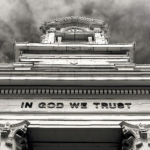The Alabama Governor’s mansion in Montgomery (the city where I live) teaches a visual lesson in private property rights. Surrounded by a high fence and conspicuous police patrol cars, the buildings and gardens on the grounds project a clear message: You are not welcome in here. Within, Governor Ivey, her staff, and guests—the most powerful people in the state of Alabama—are secure from outside interference as they conduct the state’s business. Yet each year during Advent, the mansion opens to the public, its elaborate Christmas decorations on display. This event reminds us that the mansion belongs to the people; the governor is our tenant. The mansion remains exclusive the rest of the year because it must. The governor could not do her work if she were not free to discriminate and exclude, and if officers of the law did not have the power and duty to enforce her decisions about whom to include and whom to exclude from the mansion grounds.
Just three blocks away, on South Perry Street, stands another monument to private property. This monument is also conspicuous, and for similar reasons. Two adjacent buildings stand neatly maintained, surrounded by fences, and adorned with multiple signs reading, “PRIVATE PROPERTY. NO TRESPASSING! VIOLATORS WILL BE PROSECUTED!,” “Private Medical Decisions. NO TRESPASSING!,” and “STOP. DOOR IS LOCKED AT ALL TIMES.” The buildings are festooned with rainbow flags and signs bearing equal signs and slogans such as, “Keep Abortion Legal.” Every few months seasonal signs also appear expressing opposition to former Alabama Chief Justice Roy Moore and support for Moore’s political opponent of the moment. (At present, that’s the Democratic Senate nominee, Doug Jones.)
One of these buildings houses Montgomery’s only abortion clinic. The other, called “P.O.W.E.R. House,” is home to an organization that facilitates abortions and promotes various political causes of the sexual revolution. Public records show that the two buildings are owned by different entities. But of course, property owners of a feather flock together. Judging from the stated activities of Power House, which include escorting women into the abortion clinic and hosting their (other) children while they obtain abortion-related services, it seems that the residents of each parcel have standing licenses to enter the other parcel. A sign in the alley between the two buildings warns motorists to watch for adults and children crossing from one building to the other.
Within the close of this compound, formed on the basis of ancient property rights to use, exclude, and license entry, Americans exercise their fundamental rights of association and expression. Abortionists and sexual-identity activists are free to pursue their activities and express their political views because they are free to discriminate and exclude others from their private property. They are secure in their freedom because the people of Alabama stand prepared to protect their property rights, even though a majority of Alabamians disapprove of how they exercise their freedom.
Start your day with Public Discourse
Sign up and get our daily essays sent straight to your inbox.On December 5, the Supreme Court of the United States will hear oral arguments in Masterpiece Cakeshop v. Colorado Civil Rights Commission. The case presents the issue (among others) whether conscientious business owners who understand marriage to be a man-woman union will be deprived of their ancient property rights, the same rights enjoyed and exercised by governors, attorneys general, abortionists, and sexual-identity activists to carry out their activities consistent with their beliefs and duties.
Masterpiece Cakeshop is one of three in which state courts—in New Mexico, Colorado, and Washington—have recently abrogated centuries-old common-law rights in order to require conscientious business owners to participate in same-sex weddings. Governors, state attorneys general, discrimination commissioners, and other state officials have thrown the weight of their offices against the business owners. In none of the three cases were the business owners discriminating against people because of sexual orientation. All willingly served, and one employed, people known to have same-sex attractions. They simply were not willing to use their property, labor, and talents to communicate what they understand to be a falsehood about the nature of marriage.
Property rights secure all the other fundamental rights and liberties of common law and American constitutionalism. And, not surprisingly, these cases implicate freedom of conscience, religious liberty, and rights of expression and association. Most of the briefs in the Masterpiece Cakeshop case have focused on one or more of those fundamental rights. I have submitted amicus curiae briefs in Masterpiece Cakeshop and a related case, Arlene’s Flowers v. State of Washington, reminding the Court that important property rights are also at stake, and encouraging the Court to adhere to its precedents upholding property rights in cases involving moral and political controversies.
My argument is simple. Just as governors, abortionists, and sexual-identity activists enjoy legal protection for their property rights, so do religious business owners. Property rights have always served as important securities for pluralism and ordered liberty in the United States, from a time long before the American founding. Our fundamental rights grow out of the common law, which we inherited from England, the historic basis of which is the protection of property rights against absolutist claims by rulers. Private property rights are not just means of providing for oneself and one’s family. They also stand guard around millions of little dominions, zones of liberty in which groups and associations pursue their own common goods, which others might not share or value, free from outside interference.
This liberty entails the right to choose whom to include and exclude, and for what purposes. Just as governors and political activists must have the power to discriminate when licensing entry to the property under their dominion and control, so too must property owners who have no political ambitions but are simply trying to earn a living by doing something good, beautiful, and economically valuable.
State officials and prominent law professors counter that an owner relinquishes many of its property rights, especially the right to exclude, when it opens its private property to the public for commercial purposes. Tellingly, they have shown no interest in applying the logic of their arguments to abortion clinics, despite ample opportunity to demonstrate that their argument is sincere.
Anyway, they misstate the law of public accommodations. As I explain in one of my briefs (citations omitted),
As the [Supreme] Court observed [in Hurley v. Irish American Gay, Lesbian, and Bisexual Group of Boston], at common law those who profess to be employed by the public on their private property grant to the public a license to enter for the purpose of acquiring the goods or services on offer. That license can be refused or terminated for a “good reason.” This means that business owners have a limited nondiscrimination duty; they can refuse service but must have a valid reason for that refusal.
This case falls in the broad category of public accommodations where the business owner has neither a general duty to serve nor a liberty to deny service arbitrarily. The strength and contours of the nondiscrimination duty vary according to the source of the public’s license to enter. Where the customer’s license is created by contract, such as a ticket to a sporting event, the license is a mere privilege terminable at the will of the venue owner. At the other end of the spectrum, where the business is chartered as a common carrier, utility, or other public monopoly, the owner has a general (though not unlimited) duty to serve all on equal terms. In between those two poles are cases, such as this one, in which private property is held open for a particular business purpose. In these cases, the public’s license to enter and conduct business is neither terminable at will nor a vested right to be served. It is a license carved out of the owner’s estate by the owner’s purpose for opening to the public.
Where the business owner is religious, those valid purposes for serving and refusing to serve may lawfully include religious purposes.
The property professors who oppose property rights in these cases overlook those important distinctions. Fortunately, the Supreme Court has not. Instead, the Court has correctly restated the law of property and public accommodations on several occasions.
Indeed, the Court has gone so far as to rule that state universities who own their campuses may exclude from their private property groups whose religious beliefs are inconsistent with the universities’ educational and political goals, even where such exclusion burdens the religious groups’ First Amendment rights, as long as the burden on religious liberty is an effect, and not the purpose, of the discrimination. Writing for the majority in Christian Legal Society v. Martinez, Justice Ginsburg affirmed “a State’s right to preserve the property under its control for the use to which it is lawfully dedicated,” the basis of the University of California’s power to exclude the Christian Legal Society from official recognition on its law school campuses. This is why the governor of Alabama, like the governors and attorneys general of New Mexico, Colorado, and Washington, has the power and duty to exclude from private property owned by the state.
Like abortionists, LGBT political activists, and the University of California, religious business owners who refuse to participate in same-sex ceremonies are not acting for a prohibited, discriminatory reason. Though the effects of their business judgments fall differently on same-sex couples than on natural marriages, they do not exclude LGBT people from their businesses.
Property rights are for everyone. The Supreme Court should admonish state supreme courts to follow its precedents and restore the foundations of ordered liberty.













